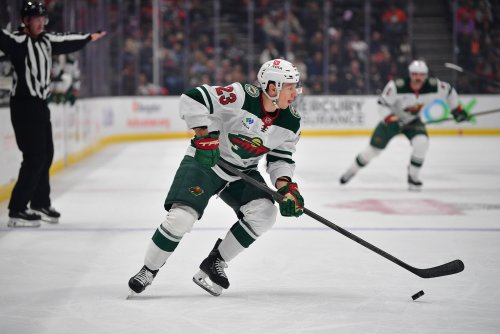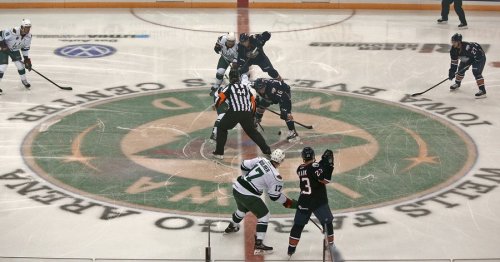
If you had told me this offseason that Mikael Granlund and Jason Zucker were on the Wild’s second line, my head would have been filled with thoughts of a deep, balanced Wild lineup that was firing on all cylinders with scoring coming from every line. Instead, perception is that Granlund and Zucker have gone from offensive dynamos to offensive duds and have caused Head Coach Bruce Boudreau to resort to his trusty Line Blender (patent pending) and change what had been his most successful line last season and, as of the Wild’s last game against Colorado, they’re on the second line with Wild captain Mikko Koivu.
As these three players are established players, I’ll primarily be comparing them against their last two seasons to see if they are matching, exceeding, or falling short of what we could reasonably expect from them given recent past performance. Please note, aside from goals/assists/points, all of the numbers used below are 5on5 based numbers unless stated otherwise.
Mikko Koivu - Center
Here’s the topline numbers, Koivu has scored 7 goals and notched 21 assists in 45 games played. That pace would be good for 51 points over a full 82 game season and that is just about what you would expect from Koivu at 35 years old and in a second line role.
However, we all know Koivu brings so much more than his offensive production when he’s on the ice and he’s long been one of the best (if not the best) defensive forwards in the league. The eye test seems to indicate that Koivu has bounced back somewhat from a down year, and the numbers back that up. Koivu has pushed his possession stats to about 52.5% (up from about 49% the past two seasons) and his high danger chances for are about 56.5% (which is actually down from the last two seasons where he was north of 60%).
What really surprised me was his usage. The percent of time Koivu starts in the offensive zone this season it is just above 50% whereas in 2016-17 and 2017-18 it was 34.95% and 39.13% respectively. So, he’s still driving play but he is being helped by easier deployment (at least by zone start) but his points haven’t seen much of a spike.
For those who care, Koivu’s faceoff percentage in all situations is back up to above 54% after dipping to about 51% last season. Given the amount of research showing that winning faceoffs if not as impactful as once thought, that doesn’t move his grade much at all. That being said, given how much the stat is shown in broadcasts I feel compelled to include it here. So, faceoffs up, Koivu good.
Midseason Grade: B. Koivu is doing Koivu things, but with an increase in offensive zone starts, I’d really like to see a corresponding jump in his offensive production as well.
Mikael Granlund - RW
Granlund has 41 points through 50 games played composed of 12 goals and 29 assists which puts him on pace for about 67 points over a full 82 games. That is exactly the number of points he put up last year and just 2 points off his career best. I was actually surprised by this as I generally had the sense that Granlund was struggling, but it seems (from a point production standpoint) he’s been just fine.
Looking at Granlund’s “fancy stats”, he also emerges with a passing grade. His possession numbers have also bounced to almost 53% after being at 49.84% in 2017-18 and 48.59% in 2016-17. His high danger chance for number is consistent at about 60% which, um, very good. If anything, Granlund has been unlucky as the shooting percentage when he is on the ice is just over 7.5%, which is 1.5% lower than last season and 3% lower than two seasons ago.
What jumped out at me is that Granlund has already drawn 10 penalties this season which puts him on pace for a career high in penalties drawn. Conversely, he has also committed 7 penalties this season which is also on pace for a career high. I do not see a Lady Byng trophy in his future this season.
Midseason Grade: B+. I really thought this would be lower, but Granlund has been producing at a similar pace as in the past and, if anything, has been a bit unlucky so far this season.
Jason Zucker - LW
The narrative almost writes itself: “After a career year and signing a big contract, player stops producing”. In 49 games played this season, Jason Zucker has 12 goals, 13 assists for a total of 25 points. Over a full 82 game season, that is a 41 point pace. Which, yikes. that is not what you want to see from a player who was just signed to a $5.5 million deal. It is, in fact, 3 fewer points than Zach Parise has right now.
I’m going to move past his basic advanced stats (they’re fine, 53% CF and 59.2% HDCF) and look at what is going on with a player who last year was one of the most electrifying on the team. What I was afraid I would find was that he was shooting a lot less than previous seasons, but Zucker has 135 shots in those 49 games, which would actually put him at a career high over a full 82 game season.
What then seems to be the problem? Shooting percentage. Zucker has an all situations 9.6% shooting percentage this season which is less than both his career averages (12.3%) and last season when he posted a career high (14.3%). Even worse, the shooting percentage when he’s on the ice at 5on5 is 6.52%. To try and determine whether Zucker is just unlucky or whether something is different about his game, so I pulled up a shot heat map from Sean Tierney’s Tableu Public.
As you can see, Zucker is generally shooting where you would like to see him shoot, but he is slightly underperforming his expected goals (xG).
The numbers and the eye test indicate Zucker has not been playing at the level we have come to expect. This could lead one to draw one of the following conclusions: (a) Zucker seriously overperformed in a contract year and was a prime candidate for regression, what we are seeing now is that regression manifesting itself; or (b) Zucker is suffering from a low shooting percentage and he has just been unlucky so far this season making him a prime contender for a bounce back. Which one is correct? Only time will tell.
Midseason Grade: C-. Zucker’s underlying numbers are fine to good, but at a certain point that needs to translate into results and so far this season those haven't been forthcoming.
Granlund and Koivu have been largely fine to good, but Zucker is clearly struggling. If the Wild want to advance from the bubble to be a real contender in the Western conference, they need more from all three players, especially Zucker who should be a dynamic part of a top line instead of a lesser part of a second line.
All statistics courtesy of naturalstattrick.com unless otherwise noted. Possession stats are CF%.
Think you could write a story like this? Hockey Wilderness wants you to develop your voice, find an audience, and we'll pay you to do it. Just fill out this form.









Recommended Comments
There are no comments to display.
Join the conversation
You can post now and register later. If you have an account, sign in now to post with your account.
Note: Your post will require moderator approval before it will be visible.